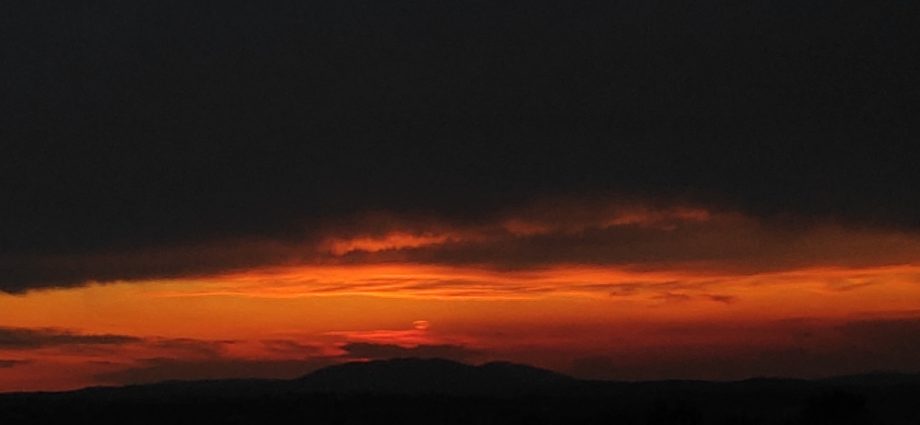Our evening was cooler than expected. A quick but fierce thunderstorm moved through our late July afternoon that day, complete with loud rolling booms, cracks of lightning, and a torrent of falling water. On the northern Appalachian Trail, among the beech, maple, and birch-covered Green Mountains of Vermont, our camping crew huddled closely together in a cozy lean-to, seeking shelter from the storm. Later, in the dark of night, after the storm subsided and the misty air waned, Katie and Eli slept in our tent and my two nephews were snugly down for the count in their sleeping bags. I sat back to enjoy whisky and steady conversation with my brother-in-law, Brent, and his wife, Amanda.
A midnight blue skyglow hugged a waxing gibbous moon. The pale lunar body shone bright against the smeared and wispy shelf remnants of cumulonimbus clouds. Behind the sky, beyond the moon, stars burned in the cosmos. They seemed to pierce a back-lit canopy as the flickering flames of our fire flashed in the night. The world was at peace until my dog Sierra began a fierce bark out of nowhere.
“Sierra, girl?” Amanda called to her with noticeable concern.
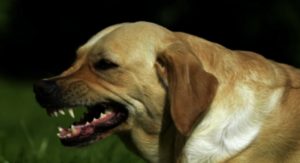
Good reason for concern, too. Sierra’s a great dog. She is kind, loyal, and very docile. She’s always barked and whined, and she can be spry as hell, don’t get me wrong, but these behaviors are all part of her play. Her tail usually wags; her face brightly smiles; her vocality is almost always genuine and kind. Not that night. Her fur rose, puffed like a wolf’s mane around her neck, and stood tall along her back. Her head hung low, with lips pulled back. Her teeth and fangs were on full display as froth dripped steadily from her mouth. She brayed that night – an almost murderous mix of growl, yip, and siren. I’ve only seen her act this way one or two other times in her life – she was protecting the village.
I assured her to no avail. She looked to me and whined, then snapped her head back towards the night to let out her warning to whatever lay in the dark.
Our campsite was nestled on a flat mound atop a steep hill. We were enveloped, surrounded by woodland to our sides and behind us, but Sierra perched at the edge of the flat grounds. Her attention was focused downhill as she let out another violent warning.
Brent lifted his head lamp, clicked on the light, and focused the glow down slope. As he surveyed the meadow beneath us, in almost an instant, he dropped the light.
“It’s okay, Sierra,” Brent soothed. “You’re just spooked.”
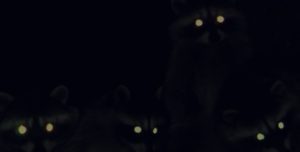
But he knew she wasn’t just spooked. He looked at me and I slightly nodded as our faces met aglow across the fire. I saw what he’d seen – four pairs of glowing eyes roughly fifty yards downslope. Sierra kept watch and continued her sincere warning for us all.
“I have never seen her act like that.” Amanda’s remark is full of nervous tension – she didn’t see the eyes, though.
“Hey, Manders, Sierra may have woken the boys.” Brent fit his headlamp to his head as he talked. “Do you mind checking on them? Might make them feel better if you lay down with them for a little bit.”
“Sure thing, this is freaking me out anyway!” she responded.
As Amanda crawled inside the tent with her boys, I let go of Sierra who immediately rose to her feet and flashed her teeth again. The same terrible growl escaped her lips.
Brent flashed his light once again down the valley and instantly turned off his lamp. The four pairs of eyes were still aglow in the dark. We channeled our inner Scotsman, yelled nonsense at the top of our lungs, and charged down the hill with bellies full of whisky courage.
Our night sky was bright as the cosmos, but the valley was dark as a Dementors shadow. Still, as we ran, we seemed aware of everything. Our pupils dilated, adrenaline kicked in, and, though we had no plan and no idea of what lay before, the action seemed right, mad, and fun. Sierra charged with us, bolting quickly ahead into the darkness. Her menacing bark threatened an awful violence.
In the mad dash across the valley, invisible amphibians croaked and belched, insects struck a chorus deep in the fields of grass, and the stars above just burned madly in the sky. With each step, the vessels of light moved up, up, up as we advanced toward our eventual battle. We roared with celebration. A cool evening breeze felt good on our skin, even as the humidity carried a familiar, heavy warmth. The scent of summer, a feeling of mad jubilation, a rush of life, and pulses of lifeblood, fueled our chaotic spree.
The terrain flattened when our running came to a stop. Sierra howled up to the sky, then lightly jogged back to my side. Excited and laughing, with a trembling hand, Brent flicked on his light to survey the area – nothing around anymore, no eyes in the dark. We stood still in the summer quiet, alone with the sounds of phantom frogs and crickets, and our own excited breathing.
With the excitement over, as Brent and I caught our breaths, I could tell my dog’s entire demeanor had changed. Gone was the fierce warrior. She became just my “pup pup” again. In the tall valley grass, her tail frantically waved – knocking small white flowers and dandelion seeds to the ground. She sneezed a few times, a sure sign of excitement, smiled, and licked us both repeatedly.
***
I don’t know why this memory has come to my attention. That Vermont trip was some four or five years ago I reckon, back in the pre-pandemic era. Perhaps that trip is on my mind because it’s July. We usually take off for a couple of weeks every July. Once the Independence Day celebrations are complete, Tennessee summers get hot and humid – perfect time to escape for a little while in north country. This year, though, no travel plans. Our lives feel weird and complicated – unhinged. Further, America is in a stage of unrest, of upheaval, teetering on the brink of . . . something. Something for sure, but what? I, for one, do not know.

American democracy has always been a fragile institution. So far, in the early stages of this 21st century, we’ve witnessed an expansion of the police state, endless wars, national surveillance systems, unstable global markets, the advancement of baseless conspiracy-laden “post truths,” violent radicalization, a plain denial of facts from everyday Americans – all the way to the highest offices of government – and a number of other internal, as well as external, threats to human liberty. Even worse, there walk among us, in this “post truth” America, those who would betray the very nature of liberty for a mutilated form of patriotism. In their jingoistic, conspiracy driven nationalism, they’d trade freedom for totalitarianism and be none the wiser.
We, as a political country, also live among who I call the “do nothing people.” People, of all races, classes, and creeds, who are annoyed when this nation is forced to deal with a supremacist history and will sit on the fence no matter who is wronged, no matter how badly someone is wronged. They may go to the ballot box, but they’ll never take to true democracy because they benefit, through money or comfort, from the status quo. They seemingly do not care about their country or their fellow travelers – only that the nation remains “stable.” As always, Dr. Martin Luther King Jr., in his “Letter from a Birmingham Jail,” has a way with words that just drives the point home:
First, I must confess that over the past few years I have been gravely disappointed with the white moderate. I have almost reached the regrettable conclusion that the Negro’s great stumbling block in his stride toward freedom is not the White Citizen’s Councilor or the Ku Klux Klanner, but the white moderate, who is more devoted to “order” than to justice; who prefers a negative peace which is the absence of tension to a positive peace which is the presence of justice; who constantly says: ‘I agree with you in the goal you seek, but I cannot agree with your methods of direct action’; who paternalistically believes he can set the timetable for another man’s freedom; who lives by a mythical concept of time and who constantly advises the Negro to wait for a ‘more convenient season.’ Shallow understanding from people of good will is more frustrating than absolute misunderstanding from people of ill will. Lukewarm acceptance is much more bewildering than outright rejection.
I had hoped that the white moderate would understand that law and order exist for the purpose of establishing justice and that when they fail in this purpose they become the dangerously structured dams that block the flow of social progress.
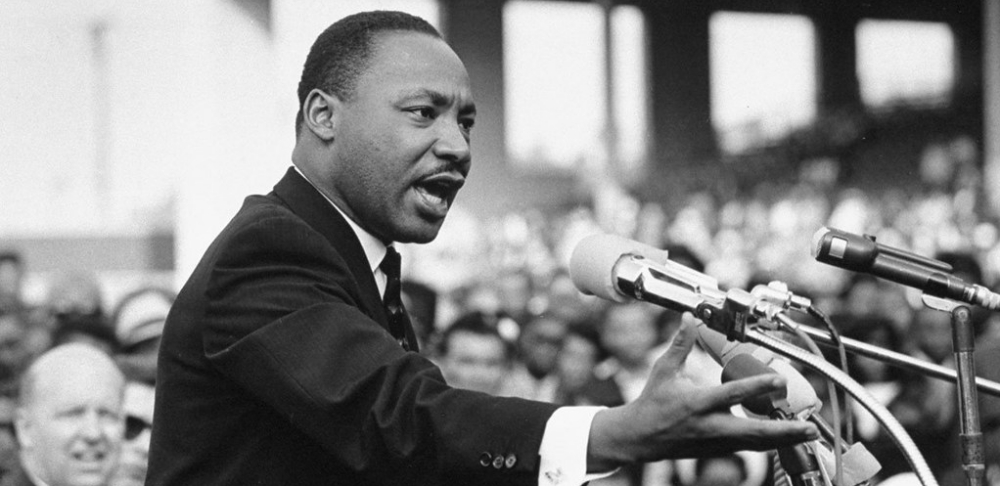
As I see it, our own nation is not free from the dangers of dictatorship. Throughout American history, the authoritarian element has worked to reign in individual and community freedoms to preserve the privileged positions of the few who control the economic, legislative, judicial, and executive powers of the United States government. So, when I see protests that challenge these systems in the streets or behind the keyboard, I see individuals practicing democracy. I see people showing authority. In the words of German activist Rudolf Rocker: “freedom is not an abstract philosophical concept, but the vital concrete possibility of every human being to bring to full development all the powers, capacities, and talents with which nature has endowed them, and turn them to individual and social account.”
I’m as nervous as anyone in America today. I wonder about the future, the society, and the planet my son inherits. We are snapshots of history that future generations will look back on. Hell, we are the snapshots our own children will look back on. With wonder, our children will realize we did not, in fact, walk through this life smoothly. Our lives were not well ordered. But, for it all, so much beauty exists out there that we continue to work through the senseless emptiness, the long night, and live our lives for the hell of it. To be alive is to take risks. Everything we experience is the great jubilation, the exciting, stressful, anarchic, incredible, diversified, opinionated, cultured, ethos – the breath of our lives, the breath of free human beings, the very lifeblood that the authoritarian strain of church, state, and culture fear. I have a great deal of concern for the world and region I know, love, and hope to grow old in. Not engaging the system is to side with the authoritarian. Succumbing to conspiracy theories, post truth lies, and pledging allegiance to any leader is an outright endorsement of authoritarianism. Again, the words of Dr. King ring ever true today:
The nation is sick. Trouble is in the land. Confusion all around. That’s a strange statement. But I know, somehow, that only when it is dark enough, can you see the stars. . . That is where we are today. And also in the human rights revolution, if something isn’t done, and in a hurry, to bring the colored peoples of the world out of their long years of poverty, their long years of hurt and neglect, the whole world is doomed. Now, I’m just happy that God has allowed me to live in this period, to see what is unfolding.
Well, I don’t know what will happen now. We’ve got some difficult days ahead. But it doesn’t matter with me now. Because I’ve been to the mountaintop. And I don’t mind. Like anybody, I would like to live a long life. Longevity has its place. But I’m not concerned about that now. I just want to do God’s will. And He’s allowed me to go up to the mountain. And I’ve looked over. And I’ve seen the promised land. I may not get there with you. But I want you to know tonight, that we, as a people, will get to the promised land. And I’m happy, tonight. I’m not worried about anything. I’m not fearing any man. Mine eyes have seen the glory of the coming of the Lord.
***
I’ve run to the mountains a lot this year to clear my head. This past July, I visited Kings Mountain in South Carolina for a solo visit. I used the trip as an excuse to drive for a little while away from Knoxville, see something new, learn a bit of United States history, and spend some time outdoors. When I finished the history walk around the Kings Mountain battlefield, I took time to meander across trickling streams along the delightfully shaded Clarks Creek Trail. The trail would have taken me to Lake Crawford, but, with the air being very hot and humid in South Carolina that day, I grew tired and decided to turn around. I’d felt good most of the day but increasingly felt achy and fatigued. It’s unlike me to feel so run down; so, I got back to the car and headed home around four in the afternoon.
On the long drive home through rural America, I thought of our family vacation on the Appalachian Trail in Vermont that handful of years ago. When Brent and I finished our would-be duel with coyotes (or perhaps raccoons, we’ve really no clue what was in the grassy valley that night) and climbed back up to our campfire, we sat underneath those piercing stars for a good while. As we passed that old barrel-aged bottle of Tennessee whisky around, the Cascade Hollow drink went down smooth as the moonlight, and we talked. In the late hours of the night, or, if you prefer, the early hours of morning, Brent floated his big question:
“Where is everybody?” Brent directed his gaze towards the stars above.
“I’m not sure I follow,” I answered, somewhat perplexed.
“Come on, man, you damn scientist! What do you think of the Fermi Paradox?”
What Brent brought up is fitting, as we sat beneath the blazing cosmos of far-away stars, on a living planet, in the cold outback of interstellar space. Some folks, when they look up to the heavens at night, take in all the beauty, and in the still moment, they ask what physicist Enrico Fermi asked at some point in the early 20th century: “Where is everybody?”
As vast as the backlit canopy is, the night sky is but a fraction of the universe. Much like all America, we can only sense, feel, and see our immediate environment. Indeed, we sit here in east Appalachian country under a starry night that blesses this Earth and contemplate all the rivers and long skies; sense all the dim prairies and sagebrush; imagine the desert hills and raw land rolling into the Cascades, the Sierra Nevada, the Olympics, and the unbelievable expanses on a continent bulging to the West Coast. When we look up at those stars, we see only our stellar neighborhood – and not even close to all of it.
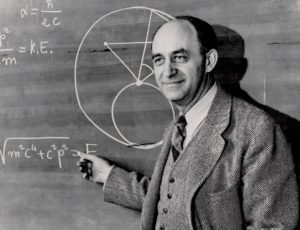
Fermi’s Paradox asks if we are alone in the universe, and this is a fair question. In an article published by the Proceedings of the National Academy of Sciences in 2013, “Prevalence of Earth-size Planets Orbiting Sun-like Stars,” the authors suggest that a potentially habitable Earth-like planet orbits at least one-percent of the total stars in the universe for a grand total of one-hundred billion Earth-like planets. To put this number in perspective, this means there are one-hundred Earthlike planets for every single grain of sand in the world.
So, back to Brent’s question: Where is everybody? This question implies there are, or will be, more advanced civilizations out there somewhere – to coexist with or follow us Earthlings. Here, I would argue that we are first.
“But, man,” I buzzingly opined, “if there are going to be more advanced civilizations out there, they will have to come from us. Their roots would be here on Earth.”
“How can you say that?” Brent interjected, scratching his red beard. “I mean, we are like a blip of dust in all of the total universe out there.”
“Yeah, but there is no evidence, literally none, of extra-terrestrial life out there. And if we discover life out there one day, it’ll likely be single-celled.”
“What makes you think that?”
“CHNOPS,” I responded with a grin.
“Grant,” he began, then shook the near empty whisky bottle, “how drunk are you?”
“No, no, it’s an acronym,” I laughingly explained, “CHNOPS stands for carbon, hydrogen, nitrogen, oxygen, phosphorous, and sulfur – life is built off of this stuff in massive amounts.”
“Yeah, isn’t there a shit ton of that stuff out there?”
“Yes, and that is kind of my point. With all of this stuff out there, we still have literally zero evidence that any other life exists – not even something like a bacterium, much less to say an advanced civilization.”
“So, you’re saying, all the numbers, all the probability, all of that, suggests we are first and only?”
“Not first and only, no. But,” I went on, “we are once in the cosmos rare.”
“How so?”
“First, we have no clue how life started – all we know is that the early Earth had the chemical conditions necessary to support life. The Miller/Urey experiment gave us that data.”
“That was the deal where they recreated the early Earth environment and got all sorts of nutrients, amino-acids, and some stuff that could be genetic molecules and all that shit, right?”
“Yeah! Exactly. So once those pioneering microbes built themselves, somehow, off CHNOPS, they then had to feed themselves. So, for billions of years, billions, hell if not trillions, I don’t know. But let’s say billions of microbes ate each other until one day, instead of digesting a meal, one microbe figured it’d try living as a eukaryote instead. And then, from this new to the universe thing you had to wait millions of years again for something like a worm to evolve, and then you had to wait like more than half a billion years to get to us.”
“I see your point, but I’m not sure I buy that we are alone. The universe is too damn big. But, for the sake of argument, I’ll take it.”
We laughed and argued until the whisky was gone, then crawled into our beds. That said, I really don’t know why this vacation, this night in the Green Mountains weighs so heavy on my thoughts today, or why it did on the ride home from Kings Mountain earlier in the summer, but perhaps it’s because everything else is lying heavy on my thoughts.
The world is in the middle of a pandemic, death rates are on the rise, and the United States is a hot spot for cases. We are also experiencing, yet again, record breaking global temperatures, coupled with extensive wildfires and storms, as climate change continues to pose the greatest threat to organized human civilization our species has ever known. With all this, both civil unrest and a growing civil rights movement battles an increasingly authoritarian mentality from the State. Current affairs have me feeling small, stressed, uneased, but, ultimately, hopeful. I do believe, one day, a Homo sapien, or something very much like us, will be the first, advanced, intelligent being born some place other than planet Earth. The universe will know her first “non-Earthling.” This being’s roots, however, and all that follow, will stretch back to this planet. They will know we, all of us, together, did what was necessary to survive. We, too, climbed Dr. King’s mountaintop.
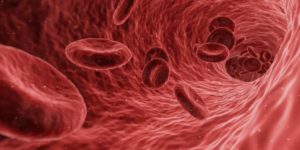
Recently, within the last week or so, I was chatting with my mom on the phone as we discussed the mania of today and she repeated my grandmother’s wise words: “We all bleed the same blood.” Those words, for whatever reason, perhaps the seeds planted in my brain from memories faded long ago, brought me a lot of comfort in that moment. My focus shifted from the social ills, to all the good that’s out there.
Folks from numerous backgrounds, from all over the world, are helping one another – pitching in whatever they can. Amid the violence, if we take time to look, we will find evidence of compassion everywhere in this world – far more than the evils that haunt and divide us. In this moment of change, perhaps we will realize that, for far too long we’ve upheld systems of domination over nature and our fellow humans. All human beings, and the natural places that inspire the culture of our communities, deserve equal regard, consideration, and dignity. We all bleed the same blood. Night is always darkest before dawn.
. . . In a couple of days my own cough will start . . .
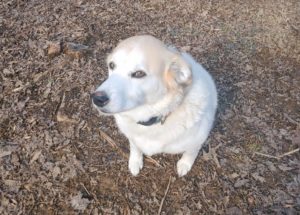
**Featured Image by Dusan Ristic on Unsplash
